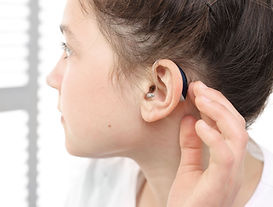
Centre for Stress Management
Established in 1987
Providing training and consultancy services for over 35 years
All courses are now delivered using the zoom virtual training platform
Tinnitus management
 |  |  |
|---|---|---|
 |  |  |
 |  |  |
 |
What is tinnitus?
Tinnitus is the name given to the noises a person can hear in their head, one ear or both ears. It is a symptom more than a diagnosis as many things can cause it. These noises are not harmful although some people find them distressing which can lead to stress, depression, anxiety, concentration and sleeping difficulties.
What does tinnitus sound like?
The noises vary from person to person. It can sound like ringing, clicking, whooshing, hissing or buzzing. Some people hear a combination of noises. The sounds can vary in volume too and may only be heard when the environment is fairly quiet.
What has caused my tinnitus?
Tinnitus can be caused by diseases of the ear, exposure to loud sounds such as music or machinery, ear blockage due to ear wax, certain medications, ear infections, Menière's disease, head and ear injuries. It can also be caused by an acoustic neuroma which is a benign (non-cancerous) slow-growing growth which presses on the nerve which carries sounds to the brain. It is important to see your GP about your tinnitus as it may be caused by a condition that can be easily treated such as an ear blockage.
Is tinnitus common?
Some research has found that up 10% to 15% of the population may suffer from tinnitus with up to 30% of the population having experienced it at some time in their life.
Are there tests for tinnitus?
Your GP will check to see if you have an ear infection or wax causing your tinnitus. The GP is likely to refer you for a hearing test or your local Ear, Nose and Throat (ENT) department. The ENT department may then refer you to a tinnitus clinic if there is one in your area. You may be referred for a MRI (Magnetic resonance imaging) scan to check if there is a problem that cannot be observed visually such as an acoustic neuroma.
Is there any treatment for tinnitus?
There are a number of interventions that may help you to manage tinnitus:
-
If you have hearing loss then a hearing aid may help.
-
Learning about tinnitus can help to reduce anxiety about it.
-
A masking device may make the tinnitus less intrusive. (These devices can produce a variety of relaxing sounds (such as white noise or the sound of the seawaves), that can mask the tinnitus. This can help a person to go off to sleep.
-
Playing background music can sometimes mask tinnitus.
-
Medication can be prescribed for depression and anxiety that has been triggered by the person’s response to having tinnitus.
-
Joining tinnitus self-help groups have benefitted many people. There is an independent network which is supported by the British Tinnitus Association (BNA). Visit the BNA website for further details. Action on Hearing Loss also list support groups.
-
Relaxation, mindfulness and biofeedback training can help to reduce the stress related to tinnitus. Also many tinnitus suffers report that their tinnitus becomes worse when they are stressed.
-
Research has found that cognitive behavioural therapy can help a person to manage their tinnitus by focusing on cognitive (ie thinking) techniques to modify thoughts and beliefs that may exacerbate their response to tinnitus. For example, instead of holding Stress Inducing Thoughts (SITs) such as, ‘I can’t stand this noise any longer’, the strategy is to develop more helpful Stress Alleviating Thoughts (SATs) as an alternative eg ‘I don’t like this noise but I can stand it’. Sometimes tinnitus is accompanied by what is known as a Decreased Sound Tolerance (DST). The cognitive behavioural approach can be used to Increase Sound Tolerance (IST). This cognitive behavioural approach also educates the person about the effect of the environment upon the perception of tinnitus.
Treatment can usually be obtained on the NHS. Depending upon the area, your tinnitus clinic may provide counselling.
Through the process of habituation (ie gradually becoming used to the noise), over time some people do not notice the tinnitus noise any more. It's as if the brain stops focusing to the noise.
Treatment by the Centre for Stress Management team
The Centre for Stress Management offers cognitive behavioural based health coaching and therapy. This approach focuses on the coping strategies and techniques covered in items 7 and 8 in the list above. These techniques generally help a person to respond differently to tinnitus by challenging stress inducing thoughts (SITs) and developing a more helpful stress alleviating thoughts (SATs). This is known as cognitive restructuring. If you are interested in receiving tinnitus management coaching (TMC) or therapy, please contact the Centre regarding fees. Virtual coaching or therapy is undertaken using Zoom, Skype or VSee platforms.
Practitioners include Professor Stephen Palmer PhD, a Chartered Psychologist and Accredited CBT Therapist and Coach, who is a leading stress expert. He is a HCPC Registered Health Psychologist and a member of Tinnitus UK.
Email for further information: stephen.palmer (at) iafpd.one
Health coaching for tinnitus management research project
The Centre for Stress Management and National Wellbeing Service team have launched a project, Health coaching for tinnitus management. We are collating published research that focuses on tinnitus management.
Useful tinnitus links
Tinnitus UK
Tinnitus UK: self-help groups
Useful Videos
Tinnitus UK: videos about tinnitus
An Interview with Sandy Grimes, Hearing Therapist
Interview with Roland Schaette
Education
University of Iowa Health Care has uploaded a very interesting and useful lecture about Current Approaches to Helping the Tinnitus Patient. The expert is Dr Richard Tyler PhD. Check it out below.







